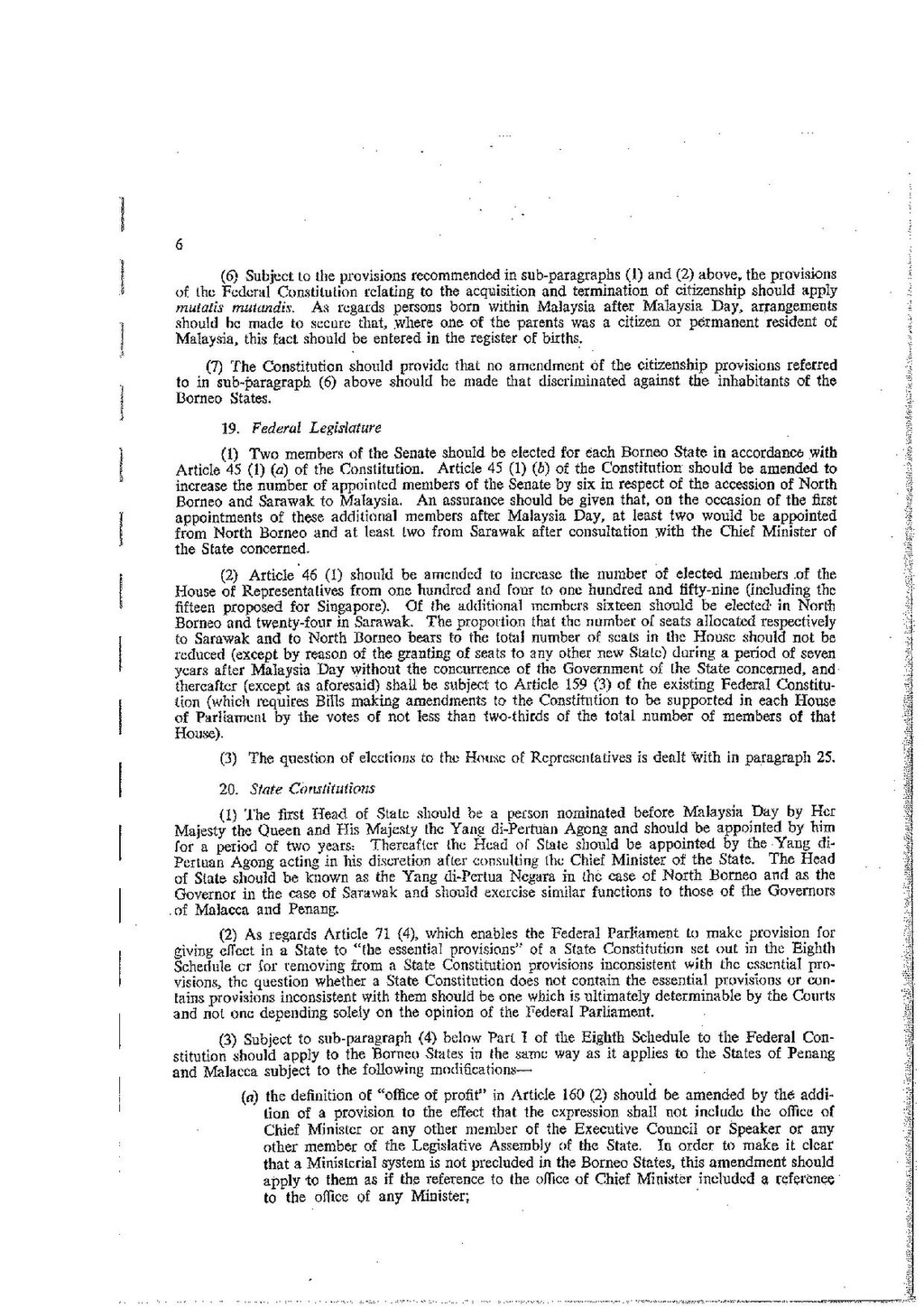6
(6) Subject to the provisions recommended in sub-paragraphs (1) and (2) above, the provisions of the Federal Constitution relating to the acquisition and termination of citizenship should apply mutatis mutandis. As regards persons born within Malaysia after Malaysia Day, arrangements should be made to secure that, where one of the parents was a citizen or permanent resident of Malaysia, this fact should be entered in the register of births.
(7) The Constitution should provide that no amendment of the citizenship provisions referred to in sub-paragraph (6) above should be made that discriminated against the inhabitants of the Borneo States.
19. Federal Legislature
(1) Two members of the Senate should be elected for each Borneo State in accordance with Article 45 (1)(a) of the Constitution. Article 45 (1)(b) of the Constitution should be amended to increase the number of appointed members of the Senate by six in respect of the accession of North Borneo and Sarawak to Malaysia. An assurance should be given that, on the occasion of the first appointments of these additional members after Malaysia Day, at least two would be appointed from North Borneo and at least two from Sarawak after consultation with the Chief Minister of the State concerned.
(2) Article 46 (1) should be amended to increase the number of elected members of the House of Representatives from one hundred and four to one hundred and fifty-nine (including the fifteen proposed for Singapore). Of the additional members sixteen should be elected in North Borneo and twenty-four in Sarawak. The proportion that the number of seats allocated respectively to Sarawak and to North Borneo bears to the total number of seats in the House should not be reduced (except by reason of the granting of seats to any other new State) during a period of seven years after Malaysia Day without the concurrence of the Government of the State concerned and thereafter (except as aforesaid) shall be subject to Article 159 (3) of the existing Federal Constitution (which requires Bills making amendments to the Constitution to be supported in each House of Parliament by the votes of not less than two-thirds of the total number of members of that House)
(3) The question of elections to the House of Representatives is dealt with in paragraph 25.
20. State Constitutions
(1) The first Head of State should be a person nominated before Malaysia Day by Her Majesty the Queen and His Majesty the Yang di-Pertuan Agong and should be appointed by him for a period of two years. Thereafter the Head of State should be appointed by the Yang di-Pertuan Agong acting in his discretion after consulting the Chief Minister of the State. The Head of State should be known as the Yang di-Pertua Negara in the case of North Borneo and as the Governor in the case of Sarawak and should exercise similar functions to those of the Governors Malacca and Penang.
(2) As regards Article 71 (4) which enables the Federal Parliament to make provision for giving effect in a State to "the essential provisions" of a State Constitution set out in the Eighth Schedule or for removing from a State Constitution provisions inconsistent with the essential provisions, the question whether a State Constitution does not contain the essential provisions or contains provisions inconsistent with them should be one which is ultimately determinable by the Courts and not one depending solely on the opinion of the Federal Parliament.
(3) Subject to sub-paragraph (4) below Part I of the Eighth Schedule to the Federal Constitution should apply to the Borneo States in the same way as it applies to the States of Penang and Malacca subject to the following modifications—
